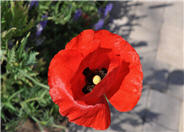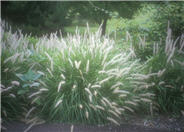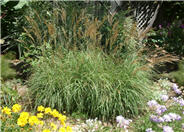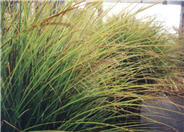
Common name:Flanders Poppy
Botanical name:Papaver rhoeas 'Flanders Field'
This beautiful annual has bright red single flowers, each petal often marked at its base with a large black blotch. Sow seeds in spring. Flanders Poppy is attractive near entries, walkways, and in containers. It can reach 3' tall and prefers full sun in well draining, rich soil. It may re-sow.

Common name:Oriental Fountain Grass
Botanical name:Pennisetum orientale
Oriental Fountain Grass is a clumping, warm-season grass with spectacular pinkish white flowers in summer and sometimes fall. Flower plumes change to light brown. Foliage is a bright green that changes to straw color as winter approaches. This grass is 2.5' tall and wide. It usually does not reseed. This grass is striking if backlit to show off flower plumes.

Common name:Eulalia Grass, Japanese Silver Gras
Botanical name:Miscanthus sinensis
Miscanthus sinensis is popular ornamental grass. Red flowers are held well above foliage clumps, appearing in summer, and may be cut for fresh or dry arrangements. Miscanthus needs full sun and watering at least once a week and more during hot summers. Foliage is variegated, with a thin white band down the center. This grass does great in coastal as well as warm inland valleys.

Common name:Australian Willow, Wilga
Botanical name:Geijera parviflora
This evergreen tree reaches 25' tall and 15' wide, with 3"-6" long, olive green colored leaves that are narrow. Its main branches sweep up and out, while the smaller branches tend to hang down. Cream colored flowers appear in spring and fall. This beautiful tree has the weeping willow look as it matures. It is wind resistant; plant in full sun. Once it's established, it has low water needs.

Common name:Variegated Silver Grass
Botanical name:Miscanthus sinensis 'Variegatus'
This mounding grass will grow to about 6' high and has deciduous, greenish-white variegated leaves.

Common name:Sweet Alyssum
Botanical name:Lobularia maritima
Lobularia maritima is an annual. It is a low branching, trailing plant to 1' tall, with narrow or lance-shaped leaves .5"-2" long. There are tiny, four-petaled, white flowers crowded in clusters.

Common name:Strawberry Tree
Botanical name:Arbutus unedo
This plant is either a small tree or large evergreen shrub. It has a red-brownish trunk and branches that are twisted with age. The dark green leaves have red stems. It has clusters of small, white or greenish-white urn shaped flowers and small, red and yellow round bumps that has a strawberry like texture from which the common name is derived. It has slow to moderate growth to15' with the same spread. It can become damaged in severe winters.

Common name:Karl Foerster Feather Reed Grass
Botanical name:Calamagrostis X acutiflora 'Karl Foerste
This ornamental perennial grass grows 4-6' tall x 1-1.5' wide and has semi-evergreen foliage that is green in spring and summer and turns green/brown in fall. The flowers bloom in mid June and emerge a light green but quickly turn to pink/purple.

Common name:Elijah Blue Fescue
Botanical name:Festuca glauca 'Elijah Blue'
The 'Elijah Blue' is a lovely ground cover grass with silver blue foliage that quickly reaches 12" tall and wide. This evergreen grass has golden flowers that bloom in summer. However, 'Elijah Blue' is grown for its foliage. Plant in full sun in coastal areas; in warm inland areas, it should receive afternoon shade to prevent it from turning brown. It is drought tolerant once it's established. It prefers well draining soil.
More than half of the water used at your home is for outside purposes. Studies show that on average, half of the water used outdoors is wasted. The leading cause of waste is incorrectly set and poorly managed irrigation controllers. The second biggest cause of wastage is broken irrigation equipment that goes undetected. There are a few basic things you can do to make a big difference in your water use.
Click in the green box for more information
If you have impermeable paving that you would like to make permeable, there are two main methods for doing so:
1. Break up hard paved surfaces to create spaces for water to seep through.
2. Remove and replace the surfaces with permeable paving.
Click in the green box for more information
Designer: Jody Palmer
Photographer: GardenSoft
Maintain a two to four inch layer of mulch on the soil surface to reduce weeds, infiltrate rain water, and reduce compaction.
Remove irrigation water and fertilizer from areas where you don't want weeds to grow.